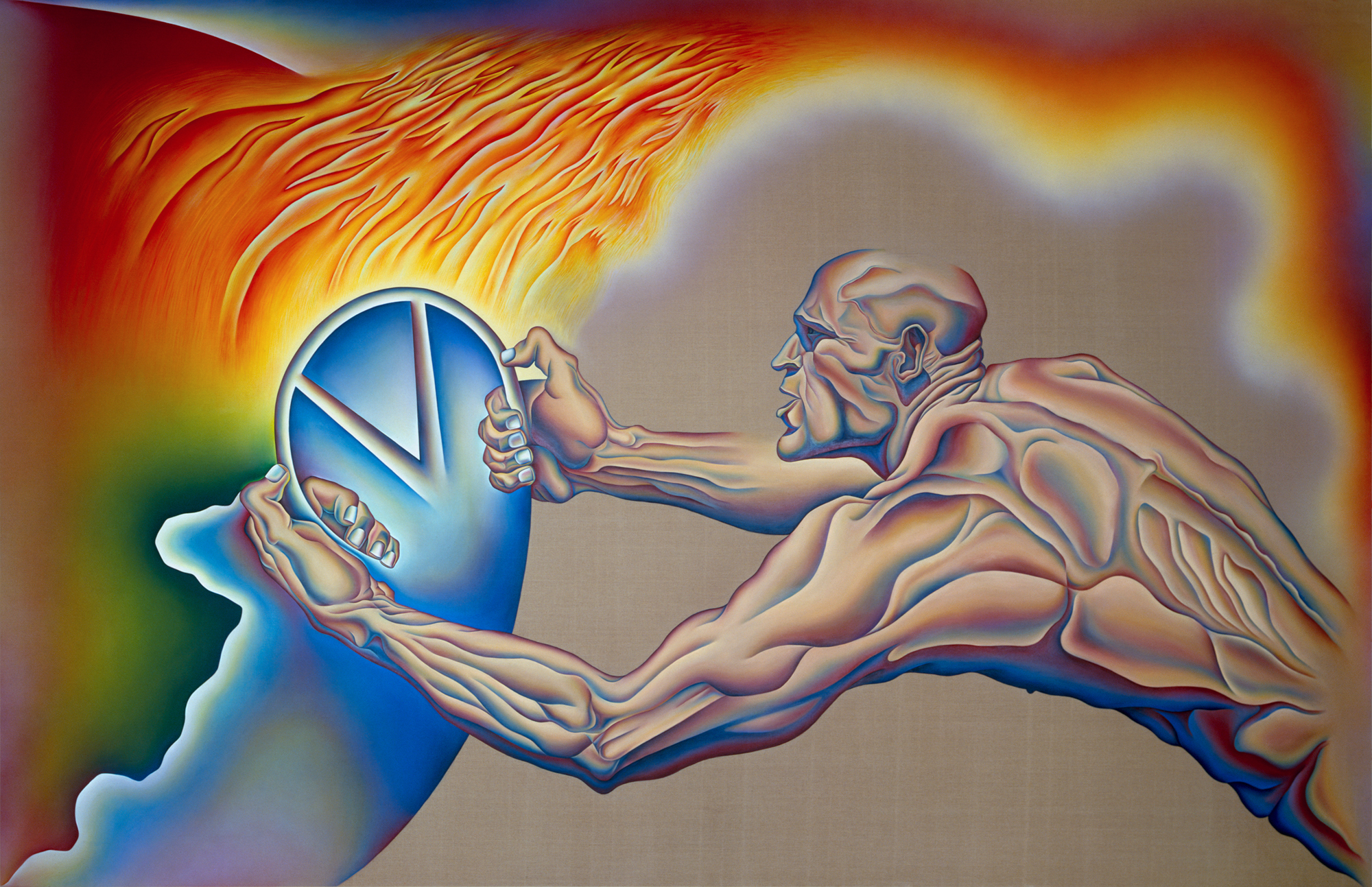


Judy Chicago, Driving the World to Destruction, 1985, sprayed acrylic and oil on Belgian linen, 108 x 168 in. (274.32 x 426.72 cm). Collection of the Jordan Schnitzer Family Foundation. © Judy Chicago/Artists Rights Society (ARS), New York; Photo © Donald Woodman/ARS, NY
There is a Jewish mandate that asks us to: “Choose Hope” even in the darkest of times and that is something I have always tried to do even when my life was very challenging and/or the subject matter of my work was really ‘dark’; for example during the eight years my husband, Donald Woodman and I spent on the Holocaust Project or the two grief-stricken years I spent on the Extinction section of The End, exploring what horrors we are inflicting on other creatures. And even though I’ve tried to stay current on international affairs, I have tried to remain focused on my studio work – and to CHOOSE HOPE even when things seemed hopeless.
Many years ago, Donald and I heard the Holocaust survivor and author, Elie Wiesel, speak at a nearby university. At the end of his lecture, he asked for questions and many of the students who responded expressed a deep hopelessness about the world and their future. I will never forget what Wiesel said. “How is it that I – who have faced the worst the world can do – am hopeful while you, who are at the beginning of your lives, express such despair?” Right now, I can completely understand why young people would feel hopeless as we are bequeathing you a world that is facing unimaginable challenges at a time when our leadership is pathetic and inadequate.
We are watching our elected representatives refuse to work together to solve our many problems, preferring to focus on their own desperate need for power instead of the common good. And we are watching men like Putin driven mad by power with the results predicted by my painting from thirty years ago. It is difficult for me to feel any hope right now but still, the mandate to choose it in the face of such darkness remains strong.
I am of the generation that changed the face of America through the anti-Vietnam war movement, the Civil Rights movement, the Women’s movement and the LGBTQ movement, which brought freedom to thousands of Americans who had lived in the shadows and – for artists like me – had to hide who they were through a supposedly ‘universal’ abstract art language that disguised the primacy of the experiences of white men. Today, artists can be themselves in their work which is no small matter. So I know change can happen but not without a lot of work, dedication and personal sacrifice.
In my first “Chicago Gazette” I spoke about the satisfaction I felt about having achieved my goals in life, which involved making a contribution to art history; assuring that my work would not be erased as has happened to so many of our foremothers; and to offer a path for others who want to transform our world into a place of justice and equity. But my path required me to stand up for what’s right and to pursue my vision of what art could be, no matter the personal cost (in my case, no financial security for most of my life, bad reviews and isolation) – but I didn’t care. And neither should you. If I can say anything to you, especially my younger readers, it is to HAVE COURAGE and above all; CHOOSE HOPE.
I have just read Jane Goodall’s recent book in which she explains why she speaks all over the world about her reasons for believing in hope. As I often say; we MADE this world and we have the power to TRANSFORM IT IF WE WORK TOGETHER. But this requires thinking beyond oneself at a time when social forces, especially social media, encourage us to focus on the personal. But ultimately, as the Women’s Movement made clear; the personal IS the political, in that personal experiences are shaped by global inequality, which has a lot to do with current events.
Please send comments or replies to info@judychicago.com.